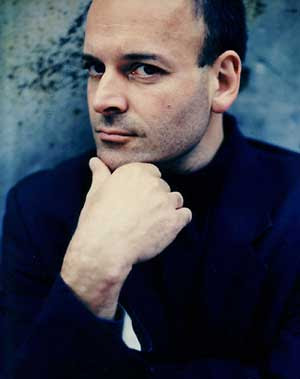Louis Lortie at Shriver Hall
| Lortie on Disc: Chopin Etudes Chopin Preludes etc. Chopin Etudes: Maurizio Pollini Murray Perahia John Browning Claudio Arrau |
 Louis Lortie, photo by Kass Kara |
As in his concert at the National Gallery, Lortie played on a loaned Fazioli piano. In the Shriver Hall auditorium, the instrument did not have the same ring: the upper range sounded much more clearly than the lower, which was a little muddy, an impression perhaps made worse by Lortie's heavy pedaling. Lortie got off to a slightly rough start with the dozen etudes in op. 10, especially in the relentless right-hand "waterfall" of the first etude and the chromatic passagework of the second. The "torrent" of the C-sharp minor was more consistent, impressively bombastic, as was the "toccata" of no. 7, with all those notes in the right hand lined up nicely. In the slower etudes like the E major and E-flat minor, Lortie leaned toward a hushed, internal, enigmatic quality. In the deadly "black keys" prelude, Lortie lightened up his right hand remarkably, allowing him to voice the inner voices quietly.
After intermission, Lortie began strongly with the Trois Nouvelles Études, pieces left off the printed program, as Lortie explained before he sat down on the bench, but that lead in to op. 25 quite well. The first one of these lesser-known pieces was the most enigmatic, and the last was beautifully murky and understated, giving the impression that Lortie had regained his feet. Indeed, the op. 25 set was much stronger technically, right from the start with a shimmering Aeolian harp etude. Lortie got better and better with a sotto voce F minor (the "bees" heard inside the hive), a delightfully clutzy "wrong note" etude, nearly flawless command of the "thirds" and "sixths," and a booming and rock-solid "octaves." By the time we got to the "winter wind" and the C minor, Lortie was on top of his game. An enthusiastic audience earned itself a substantial encore, a restless rendition of the G minor ballade.
The Shriver Hall concert series is accepting subscriptions for its 2007-2008 season. Yefim Bronfman, Nathan Gunn, Alban Gerhardt, Pierre-Laurent Aimard, the Choir of King’s College, Cambridge, and the Alban Berg Quartet are on the roster.





















































2 comments:
Will the Fazioli be at the National Gallery for a while? Ever since reading the The Piano Shop on the Left Bank, I have been dying to hear one in person.
Thomas, that instrument travels with Louis Lortie. I think he has a contract with Fazioli. So you are out of luck, unfortunately.
Post a Comment